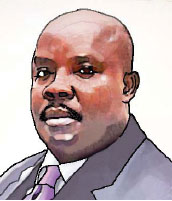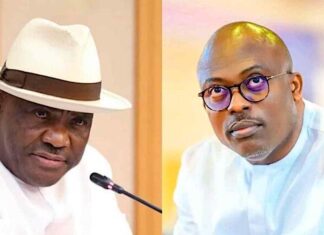When predictions credited to a certain American official on the country breaking apart in 2015 flew around, I was among those that casually dismissed the idea. It was not as if I had anchored my position on any particular beacon. But I had argued that there were many things holding the country together, that untying them would not be simple, or rather necessary. Of course, with the ugly experience of the 1967 to 1970 civil war still fresh, I had reasoned that no component part of the federation would attempt or would be forced to take any action that may affect its corporate existence, negatively, again. I was, in fact, persuaded to assume that we had learnt our lessons.
But as I indicated a couple of weeks ago, it is becoming increasingly difficult to resist the temptation of adopting the narrative of Karl Maier, in his book, This House Has Fallen. Maier, former Independent Africa Correspondent, had, in the book, painted an ugly picture of a supposedly giant Nigerian nation that had wasted its opportunities, leaving its citizens criminally deprived. Current developments in the country seem to portray Maier’s conclusion as not entirely capturing the level Nigeria has decayed. Nothing, perhaps, summarises this national degeneration as the awkward treatment the country extends to its citizenry. The name of the game, at all points, is impunity. This is the reason behind the leaders treating the people they are supposed to serve with scant regard. In similar tradition of arrogance, the citizens, who are supposed to be united by their ordeal in the hands of treacherous leaders, are turning against one another. This, to some extent, informs the volume of violence the so-called Fulani herdsmen are unleashing on other Nigerians. It is also this culture of impunity that has made the government of President Muhammadu Buhari turn its eyes the other way, while the marauders convert the entire country to their killing field. The impression is that because Buhari is a Fulani, he is finding it hard to rein in his kinsmen. This may not be easily established. But what cannot be readily disputed is that his Fulani kinsmen are becoming more dastardly under his administration. Perhaps, and just perhaps, they intend to act – but poorly – the way close and distant relations of Buhari’s two predecessors, Olusegun Obasanjo and Goodluck Jonathan, behaved while they were in office. During Obasanjo’s presidency, though it was hard to get him assimilated into mainstream Yoruba politics, a militant group in the zone, Oodua Peoples Congress (OPC), literally turned itself into his attack dog. On occasions when the facilitators of the organisation woke from the wrong side of the bed, they simply took over any section of the South West, particularly Lagos, claiming stumbling on attempts at truncating the Obasanjo presidency. While they engaged in their stunts, road-users and other Nigerians paid dearly. Jonathan’s Ijaw brothers copied the sheepish trait of announcing to other citizens that with their “son” in Aso Rock, they were also in charge of the remaining parts of the federation. At a time, they even took over Abuja – Lokoja expressway, demanding to be attended to before vacating the highway. While these took place, neither Obasanjo in his time, nor Jonathan, saw anything wrong with the misguided solidarity from their home supporters. And it became a culture of sorts. But bad as the situations were then, none of the odious demonstrations by Obasanjo and Jonathan’s relations came close to the current murderous dimensions of Buhari’s Fulani kinsmen. For these nomads, other Nigerians have, overnight, become wet rags to be marched on. Though the herdsmen were known to have been carrying on with this diabolical agenda before now, the audacity with which they rob, rape, maim and sack communities in the present dispensation has placed them among leading terrorist groups in the world. The unflattering result of this is that the volume of death recorded from the atrocious activities of the herders in the last one year of Buhari’s presidency has tripled the number of Nigerians wasted within the same period by the dreaded Boko Haram insurgents. No matter how this is looked at and interpreted, the unspoken message is that the situation is quite frightening. It is also more discomforting that the government has not really come up with any concrete plan at checking the menace of these marauders. Aside the belated statement by the President’s media handlers on Wednesday over the attack by the herders that left over 50 persons dead in Nimbo community in Enugu State, two days earlier there had hardly been any tangible action by the government in calling these criminals to order. The statement even appeared an afterthought. It was more of a routine directive, lacking in empathy and emphasis. The fear is that the probe advertised to have been ordered into the Nimbo massacre and others before may never see the light of day. The critical questions may thus remain unanswered. And they are; at what point did pastoralists begin to wield and flaunt sophisticated arms? Who licensed them with such lethal weapons? Were the security agents not aware of this brazen outlawry? It will remain a huge surprise if the President – retired Army General – had not adverted his mind to these weighty questions, given the vehemence with which he had descended on the Indigenous Peoples of Biafra (IPOB) self-determination agenda or how he had thundered on the Niger Delta militancy. Whether the loud silence was deliberate or not, it has clearly not helped the reputation of the President and his government among fair-minded Nigerians. It may also be sending, perhaps, an unintended message that may be interpreted from the angle of every section of the country contriving a separate template on self-defence. If this eventually becomes the norm, nobody can reasonably predict where it will lead to. But Nigeria as a corporate entity will certainly be the ultimate loser.











